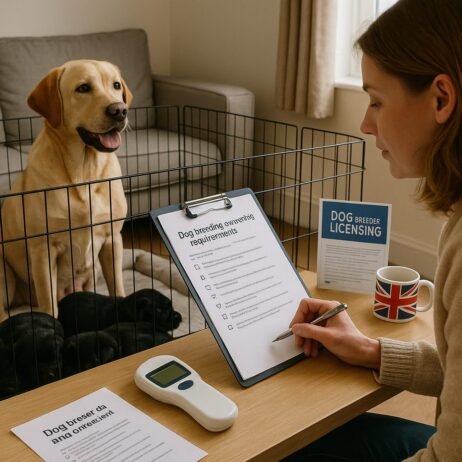New UK Laws on Dog Breeding & Ownership (2025 Guide)
- 20 September 2025
- BuyAPet Editorial Team
- All Dogs, BuyAPet User Articles (Support), Pet Law, Pet News
New government laws on dog breeding and ownership
A friendly, plain-English overview of current UK rules for breeders and owners—what’s in force now and how to stay compliant.
Overview
What’s new & why it matters
The UK has tightened standards around dog breeding and responsible ownership. Key areas include licensing for breeders, a ban on third-party puppy sales, compulsory microchipping, and specific controls under the Dangerous Dogs Act. Penalties range from fines and licence refusal to seizure in serious cases.
Breeding licences (England)
Dog breeding licence rules
Under the Animal Welfare (Licensing of Activities Involving Animals) (England) Regulations 2018, councils license commercial dog breeding. You usually need a licence if you:
- Breed 3 or more litters in any 12 months, and/or
- Breed and advertise as a business selling dogs (even below 3 litters) based on a “business test”.
Licences use a risk-based star rating, with minimum standards covering welfare, socialisation, record-keeping, and sale practices.
Sales rules
Lucy’s Law: third-party sales ban
In England, it’s illegal to sell puppies or kittens via a third-party dealer. Buyers must purchase directly from the breeder (or adopt from a rescue). This aims to end puppy farming and improve welfare and transparency.
Identification
Microchipping duties
- Dogs (UK): microchipping has been compulsory since 6 Apr 2016. Puppies must be chipped by 8 weeks; breeder is responsible.
- Cats (England): microchipping is compulsory from 10 Jun 2024 before 20 weeks of age, with up-to-date keeper details on an approved database (fine up to £500 if not compliant after a 21-day notice).
Keep records
- Update your database details within 21 days of changes.
- Keep vaccination and health records with the microchip number.
- Scan and verify chips before sale or transfer.
Dangerous Dogs Act
XL Bully rules: what owners must know
The type known as the XL Bully is listed under the Dangerous Dogs Act (England & Wales). It’s an offence to own one unless you meet exemption conditions (for example: exemption certificate, neutering by deadlines, third-party liability insurance, and muzzled/on lead in public). Scotland introduced similar measures in 2024.
Authorities use an official conformation standard to assess whether a dog is in scope. If you’re unsure, seek advice promptly.
Nations
Scotland, Wales & Northern Ireland
Animal welfare law is devolved. Core principles are similar, but dates, guidance and processes can differ (e.g., licensing policies, XL Bully timelines). Always check your nation’s official pages and your local council before breeding or selling.
At-a-glance
Quick compliance checklist
- ✅ Decide if your activity needs a breeding licence (3+ litters/12 months or trading as a business).
- ✅ Meet DEFRA’s minimum standards and keep inspection-ready records.
- ✅ Sell puppies directly (no third-party dealers) and never before 8 weeks.
- ✅ Ensure microchipping and database details are correct before sale/transfer.
- ✅ If owning a controlled type (e.g., XL Bully), follow exemption conditions strictly: muzzle/lead in public, insurance, neutering by deadlines.
- ✅ Check your nation & council guidance for any local conditions.
FAQs
Do I need a licence if I breed fewer than three litters?
Maybe. If you’re considered to be operating a business selling dogs, your council may require a licence even below three litters. They apply a “business test” (e.g., regularity of sales, profit intent, advertising).
What does Lucy’s Law mean for buyers?
You must buy directly from the breeder (or adopt from a rescue). Always see the puppy with its mother in the place it was bred, and check the breeder’s licence where applicable.
What are the microchipping rules for puppies?
Puppies must be microchipped by 8 weeks. The breeder is responsible for first registration; new keepers must update their details on the database after purchase.
What if I’m unsure whether my dog is an XL Bully type?
Use the government conformation standard as a guide and seek professional advice. If at risk, follow exemption steps immediately to avoid offences.
Official guidance & sources
- DEFRA animal activities licensing (breeding dogs) guidance (England), updated 2025.
- Lucy’s Law (third-party sales ban) – in force since 6 Apr 2020 (England).
- Dog microchipping – mandatory since 6 Apr 2016 (UK nations’ regs).
- Cat microchipping (England) – mandatory from 10 Jun 2024.
- XL Bully: Dangerous Dogs Act updates & conformation standard.
